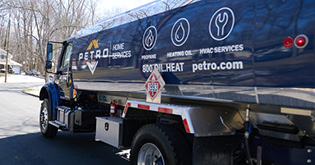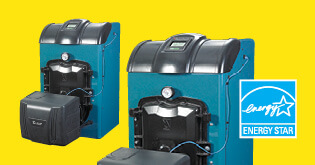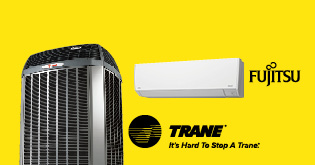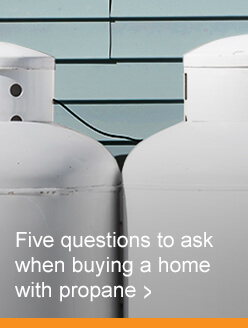- My Account:
- Sign In
- Register
- Make Payment
Propane safety tips for homes and businesses.
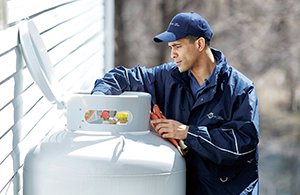
Propane use - safe handling tips and information.
We can all agree that propane gas can be an affordable and efficient way to heat your home, get hot water, cook and generate electricity. But did you know that improperly handled propane can cost you your home, or even worse, your life? It's important that you follow propane safety best practices and use caution when handling tanks, fuel lines, appliances and generators to ensure safety.
When handled properly, propane is a very versatile and safe fuel.
Here are some important propane safety tips:
Handle propane tanks carefully.
- Don’t use or store portable propane tanks in basements or living spaces
- Properly secure portable propane tanks when transporting
- Do not leave portable propane tanks in cars or closed vehicles
- Secure temporary tanks when used for building heat, hot water, or cooking
- Contact a qualified propane service retailer to connect tanks to appliances
Use propane gas appliances with care.
- Do not use propane gas BBQ grills inside
- Refrain from using propane stoves or ovens for space heating
- Do not use portable electric generators indoors – keep outside of building
- Have a qualified propane service technician connect appliances and perform a leak test
What to do If you smell gas.
- Immediately extinguish all smoking materials and open flames
- Get everyone out of the area where you suspect the gas is leaking
- Turn off the gas supply valve of your propane tank if it is safe to do so
- Once away from the leak, contact your propane supplier. If you can’t reach them, call 911
- Do not return to the area until your propane retailer, emergency responder, or qualified service technician determines it is safe to do so
- Get your system checked. Before you attempt to use any of your propane appliances, your propane retailer or a qualified service technician must check your entire system to ensure that it is leak-free.
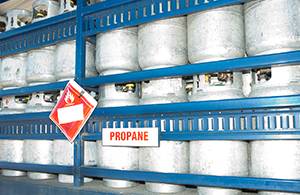
Do not run out of gas! Yes, running out of gas can be hazardous!
Serious safety hazards, including fire or explosion, can result. If an appliance valve or a gas line is left open when the propane supply runs out, a leak could occur when the system is recharged with propane. Air and moisture could get into an empty or depleted storage tank, which can cause rust build-up inside the tank. Rust can decrease the concentration of the odor of propane, making it harder to smell. If your propane tank runs out of gas, any pilot lights on your appliances will go out. This can be extremely dangerous if not handled properly.
A leak check is required.
In many states, a propane retailer or a qualified service technician must perform a leak check of your propane system before turning on the gas.
Set up regular delivery.
Establish a regular delivery schedule with your propane retailer. Also, periodically check the fuel gauge on your propane tank. If the fuel level drops below 20%, call your propane retailer.
What is odor loss?
Odor loss can also diminish propane's smell. On rare occasions, propane can lose its odor. Several things can cause this including:
- Air, water, or rust in a propane tank or cylinder can reduce propane odor concentration.
- If the propane is leaking underground, its passage through soil may reduce the smell of propane.
- The propane odor may stick to the inside surfaces of gas piping and distribution systems and possibly other materials.
- Since there is a possibility of odor loss or problems with your sense of smell, you should respond immediately to even a faint odor of gas.
If you are concerned that you or others in your home may have difficulty smelling propane, consider buying one or more propane gas detectors.
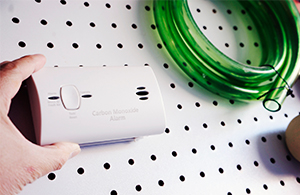
Consider installing propane gas detectors.
In some circumstances, you may not smell a propane leak. Propane gas detectors are designed to sound an alarm if they sense the presence of propane. Their operation does not depend on the concentration of odorant in the air, just the propane concentration at the detector. We recommend that you consider installing one or more propane gas detectors. This is important if you or others in your home have difficulty smelling propane, or if appliances are in little-used areas in your home where the smell of propane might not be detected. Detectors can provide an additional measure of security. Propane detector quality is important, so be sure the units you buy are listed by Underwriters Laboratories (UL). To be sure propane gas detectors operate properly, install and maintain them as the manufacturer recommends. Even if you install gas detectors, have a qualified service technician inspect your propane system and propane appliances periodically. You may also consider a carbon monoxide alarm to be extra safe.
As always, if you have any questions or concerns about the safety or handling of your propane system, please contact us immediately at 800.645.4328 and have one of our qualified technicians take a look at it as soon as possible.

